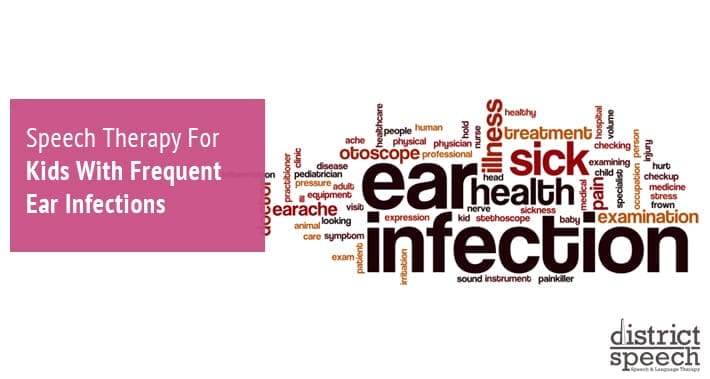
Speech is a powerful tool for your child to learn.
Their growth and development in the realms of speech and language can be exciting to watch and to be a part of.
As your child learns to communicate, however, there may be times when things don’t go as planned.
When that happens, District Speech is here to help with speech therapy for kids.
Contrary to common pediatric speech therapy myths, your child won’t necessarily grow out of their speech difficulty without investing in speech therapy.
It is a great resource to help your child hone their speaking skills.
It’s a good idea to book an appointment as soon as you notice your child isn’t meeting their speech milestones.
Ear infections are one issue that can impact your child’s speech development, and they may be an unexpected culprit if your child’s speech development seems to have slowed down or become irregular.
In this article we’re going to talk about what ear infections are, how they can affect your child’s speech development, and how our Washington DC speech therapists may be able to help.
What Is An Ear Infection?
An ear infection, also called acute otitis media, is an infection that occurs in the small space behind the ear drum, in the middle ear.
The eustachian tube runs from behind the ear drum to the back of the throat and is the route for fluid drainage from the middle ear.
If there is an issue with this drainage tube, fluid can build up in the middle ear and become infected.
This type of infection is also a fairly common complication of the common cold, when viruses from the nose and throat enter the ear through the eustachian tube and interfere with fluid drainage.
After that the ear infection proceeds like any other, in which bacteria infect the fluid that builds up in the mid ear.
The other two types of ear infections are otitis media with effusion, and chronic otitis media with effusion.
Otitis media with effusion can happen after an ear infection has subsided, but fluid is still trapped behind your child’s eardrum.
Chronic otitis media with effusion happens when your child’s otitis media with effusion is prolonged or reoccurring.
This makes it harder for your child to fight new infections and can typically affect their hearing.
There may be no other symptoms for this than hearing loss, and so you should contact your child’s pediatrician who can use a special instrument to see if there is fluid behind your child’s eardrum.
Why Are Ear Infections More Common In Children?
Ear infections are more common in infants and children because of the way that the ear develops with age.
In children the eustachian tube is both shorter and narrower than it is in adults, as well as being angled more horizontally.
This lower angle and shorter length make it easier for bacteria and viruses to enter the middle ear, and the narrower width makes it easier for the tube to get blocked.
These factors work together to put infants and children at a higher risk of ear infections that becomes less prevalent as the child ages.
Specifically, recent studies indicated that children six and under are at the highest risk.
Other risk factors for children under six include having tonsillitis, asthma, any respiratory allergy, and being born prematurely.
Signs Of An Ear Infection
In small children, it can be especially difficult to know what exactly is causing them pain or discomfort.
In the case of ear infection, even non-infected fluid buildup in the middle ear (called otitis media with fluid) can cause speech and hearing problems and can be harder to notice.
This is because your child might be too young to be able to say “My ear hurts” to you.
In young children, the symptoms of ear infection include:
- Tugging at their ears
- Extra fussiness and crying
- Trouble sleeping
- Fever
- Not responding to sounds or words they otherwise would respond to
- Fluid leaking from the ear
- Clumsiness or balance problems
Because a lack of infection likely means it isn’t causing acute pain, otitis media with fluid is often characterized by some amount of hearing loss but no other noticeable symptoms.

How Can Ear Infections Affect Hearing & Speech?
Buildup of fluid in the middle ear can distort sounds, making them sound as though they’re being heard underwater.
While this isn’t the case with all ear infections or fluid buildup, it may be the case if your child has other symptoms of an ear infection as well or is experiencing otherwise unexplained hearing loss.
Without an infection, fluid buildup can also show up as a stall in progress of speech abilities or a frequent need to have sentences repeated.
Because early childhood is a pivotal time in the development of speech and language skills, it’s important to see a doctor if you suspect that your child is experiencing hearing loss due to fluid in their ears or any other cause.
Otherwise, they could miss out on the social communication that naturally occurs when playing with peers due to their temporary hearing loss.
With early intervention speech therapy, there are options available for you and your child both to alleviate the immediate symptoms and to recover lost or stalled speech abilities.
We have hearing loss speech therapists that can help.
In the process of your child’s treatment, you may also find it helpful to work with your pediatrician, an ear, nose, and throat specialist (ENT), or any combination of those the above.
How Can A Speech Therapist Help?
Ear infections in children, especially if they are frequent or chronic in nature, may interfere with important listening time.
This difficulty hearing may cause delays in your child’s development of speech skills.
If this happens, a speech therapist can help your child catch up on missed time for developing their language skills.
Depending on your child’s age, their speech therapist will recommend activities and games for you to play with them at home to continue their learning outside of their therapy sessions.
A couple of examples include Let’s Go Fishin’ and Kinetic Sand.
If your child has experienced temporary hearing loss as a result of an ear infection and seems to be missing speech milestones, the early intervention of a speech therapist can help them catch up.
Book Your Appointment With District Speech Today
It can be frustrating and isolating when it feels like your child isn’t developing skills in the way that you hoped they would.
Thankfully, there are a variety of treatments available for ear infections, and once the root cause of the hearing loss is addressed, you and your child can start working to catch up from any losses to their speech development during that time.
Like we always say, the earlier you can catch your child’s speech delay and get them treatment, the faster we can get them back on track to meeting their speech milestones.
Take a look at this article on how to spot the early signs of a speech or language disorder if you’re not sure what to watch for.
At District Speech we’re here to help your child get back to learning to communicate as well as they can.
Book your today and work with us to get your child’s speech development back on track.
Book your appointment with District Speech today.
1300 I St NW, Suite 400 E,
Washington, DC 20005
- https://g.page/districtspeech
District Speech and Language Therapy specializes in speech therapy, physical therapy, and occupational therapy solutions, for both children and adults, in the Washington D.C and the Arlington Virginia areas.